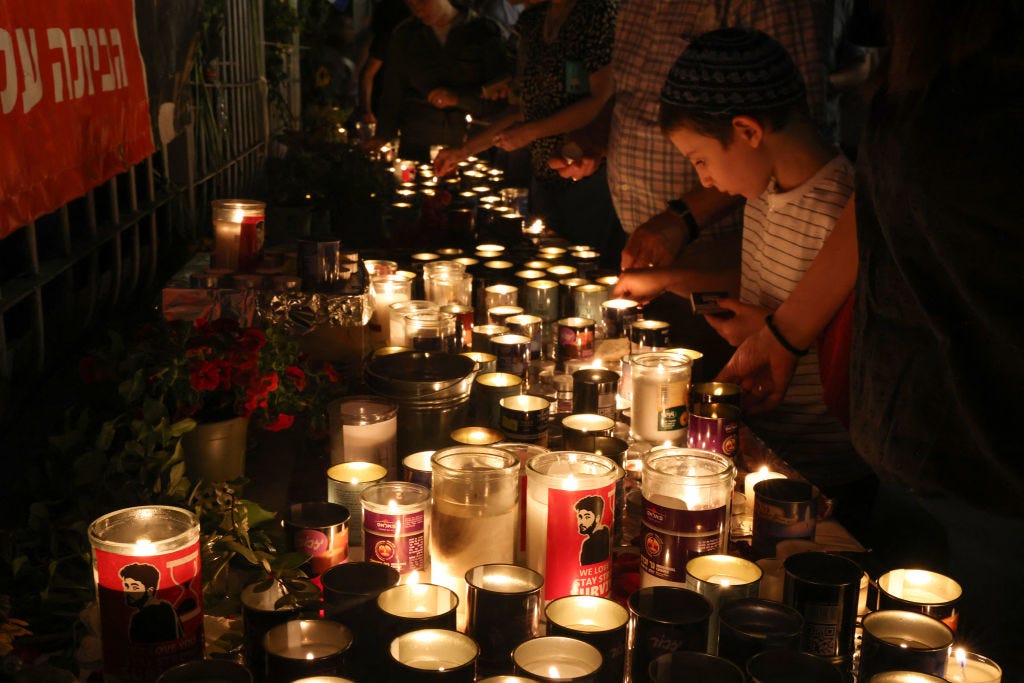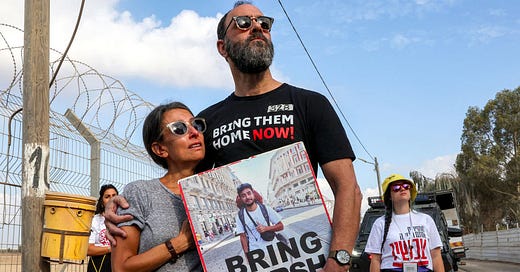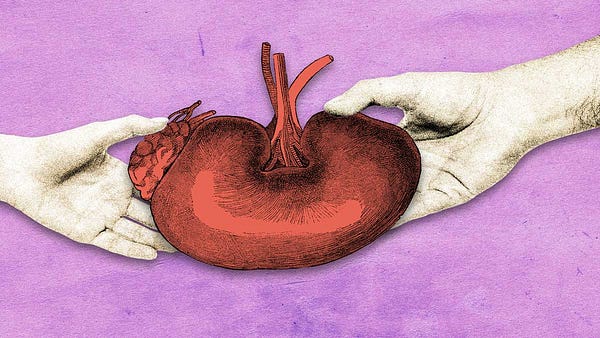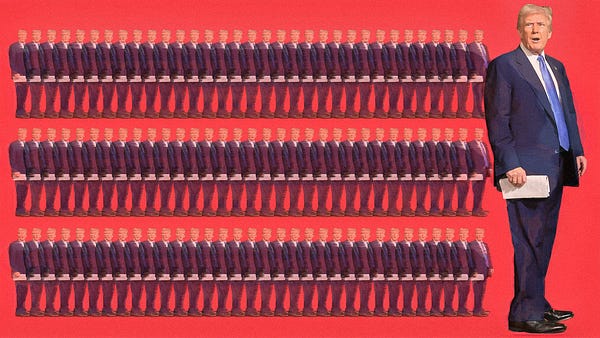
The Free Press

Last September I had dinner with Hersh Goldberg-Polin at his home in Jerusalem, which isn’t far from mine. His parents are friends, Chicago natives who came years ago and stayed.
Over the preceding years I’d seen Hersh grow from a skinny kid with a funny grin into a youth with big curly hair, then a young man with a buzz cut as he persevered through his mandatory army service despite a thoroughly civilian personality, who then set off to Europe with the attitude of someone expecting the world to greet him with a smile.
The last version of Hersh that I remember, from that family dinner, was a wry traveler making us laugh with a deadpan account of working on a falafel truck at an electronic music festival in Italy. My teenagers were an admiring audience for his adventures. He, and we, were looking forward to his next one.
One morning a few weeks later Hersh disappeared, leaving only two text messages to his mother, Rachel: “I love you.” And: “I’m sorry.” It was October 7, 2023.
There was a music festival in southern Israel that weekend called Nova, a name now infamous but then unfamiliar to almost anyone over the age of 25. He was there with friends when an army of Palestinian terrorists came out of Gaza and engulfed the festival and the Israeli communities near the border, killing more than 1,200 people and kidnapping hundreds more.
One of the first things I learned about this vast tragedy, the one still unfolding, was that Hersh was missing.
After that he appeared in flashes—a figure moving through horror videos that began to surface in the days and weeks that followed. We saw him herded at gunpoint with other captives, one arm shredded, thrown onto a pickup truck, a rough hand grabbing him and shaking him by the hair.
As the army began its offensive in Gaza, posters with Hersh’s image and the motto “Bring Hersh Home” appeared all over our neighborhood, and then across Jerusalem. Around January I fixed one outside my own apartment building with a feeling of overpowering inadequacy. Was this really all I could do?
My kids, like everyone’s kids, got Hersh t-shirts and stickers. The idea of being kidnapped by terrorists became a familiar one in our home, a subject discussed in my son’s third-grade class like kids in other countries talk about what they’ll be when they grow up. Would it be better, he asked me a few times, to be kidnapped or killed?
Meanwhile, Hersh’s parents, Jon and Rachel, crisscrossed the globe with astonishing resilience and poise, clinging to the hope that someone, somewhere, could help their son. They met the President and the Pope. Millions of people came to know Hersh’s face.
But as for the real person—the grinning raconteur from that dinner table—we heard nothing for months.
In the spring he suddenly appeared in a hostage video, hair cropped again, arm amputated. He was gaunt, wearing someone else’s clothes and speaking someone else’s words, but he was alive. If that miracle was possible then so, it seemed, was his return.
But this morning we learned that there will be no miracle. Hersh was executed by his captors not more than a few days ago, apparently within earshot of advancing Israeli forces. He was 23.
With him were five other hostages who somehow survived eleven months of captivity only to be murdered in the tunnels where they were held: two women, Eden Yerushalmi and Carmel Gat, and three men, Alex Lobanov, Ori Danino, and Almog Sarusi. All were found with gunshot wounds. All were under the age of 40.

Here in Israel, we’ve had to learn a lot since this war began. We learned that we’d be forced to navigate the most fraught moment in our history with a government that is the most extreme and least competent ever to lead this country—a dangerous lack of faith that erupted after today’s news in the form of many tens of thousands of protesters in the streets, furious at the failure to get our people home. We’ve learned that we’re nearly encircled by Iranian proxies. We’ve learned that the terrorist organization that seized Hersh—Hamas—in fact operates openly in the territory of two American allies, Turkey and Qatar. We’ve learned that Egypt, which has a border with Gaza and a peace agreement with Israel, has been allowing in the weapons that Hamas uses against us.
We’ve learned that Hamas is not universally shunned as a terror group, but actually enjoys broad support, including in the West, including among some of the most educated citizens. We’ve seen that much of the Western press is capable of turning a story about a war launched by Muslim fundamentalists into a story about the injustice of the Israeli response, and indeed about the injustice of our country’s existence. Some reports on these murdered civilians said they merely “had died,” or “were found dead,” and the tenor of coverage seemed notably less outraged than it was at the assassination in July of the leader of Hamas.
Hersh was an American citizen, born in California—and in California and elsewhere, we learned that other Americans would tear down his poster and those with the faces of other Israeli hostages. We’ve seen the support of the American administration wane as the war wears on, including an explicit demand by the White House to stay out of the southern Gaza city of Rafah—the city where Hersh and the five other hostages were just found by our soldiers, but too late.
The events that have unfolded since the day Hersh disappeared are bewildering. But today, here in his neighborhood in Jerusalem, for a moment they regained a kind of terrible simplicity, reduced to one beautiful human face.
This morning it felt like an invisible blanket had settled on the streets. It’s the first day of class, always a happy occasion. But outside the local elementary school, many of the other parents I saw had red eyes and couldn’t speak. Around here, even little kids know Hersh, and the grown-ups had just been trying to explain why nothing anyone did was enough to bring him back.
Matti Friedman is a Jerusalem-based columnist for The Free Press. He’s the author of four nonfiction books, including most recently Who by Fire: Leonard Cohen in the Sinai. Read all of his work for us right here.
And if you believe in our work support us by becoming a paid subscriber today.













"most extreme and least competent" When Shamir was prime minister it was very hard for me to retort to snide comments about Israel's terroristt gov't. It was baffling to me in the early seventies before my first visit why a Jew referred to Isaael as being in nazi germany. I wonder. Mr Netanyahu can take the blame and ask forgiveness for Oct. 7...period. Where was security? Where was the Israeli army in this tiny country ....not responding for hours? Because of Ben Gvir? Smotrich? When an Arab is in the gov't who basically despises the state Of Israel...is that extreme enough a govt for you. Incompetent....Eshkol was quaking that he preside over the elimination of Israel....I think that' s In Oren's book Six Days of War. Was Dayan incompetent when he kicked Jews off the Temple Mount.? I've asked and I"m asking here.....what do the Israeli demonstrators want from their "extreme and incompetent govt?" I watched Netanyahu's address on I 24. I think he is reasonable. Whta do Israelis want? Another Oct. 7th? As my friend has said to me...both us lifelong Zionists....it's their country to lose.
When Japan tired of all their deaths in WW II they surrendered and the US helped to rebuild Japan and make the Japanese prosperous members of the global economy. Same with Germany. Hamas won't surrender because Palestinian deaths do not deter them; they increase international support for their cause.
Every war against Israel ended with an armistice or a cease fire but never with a treaty. Israel is justified in demanding a different ending this time: a treaty--one that will create a disarmed Palestinian state giving Palestinians an opportunity to prosper and join the global economy alongside Israel. One whose peace is guaranteed by a coalition of the U.S., Egypt, Jordan, Saudi Arabia, and members of the Abrahamic Accord. One so strong and unequivocal that Iran would no longer dare to meddle with members of this alliance.